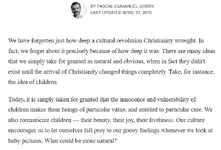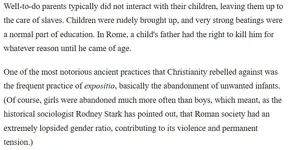I've searched the Christianity (General) category for a thread exploring this topic and haven't found one. If I missed it, please delete this thread. This thread should be a place for people to post information about how Christianity built the Western civilization. Please keep the discussion cerebral and avoid sophomoric insults.
You are using an out of date browser. It may not display this or other websites correctly.
You should upgrade or use an alternative browser.
You should upgrade or use an alternative browser.
How Christianity Built Western Civilization
- Thread starter JoeChill
- Start date
Christianity is so foundational to our civilization it is exceptionally difficult to find something NOT built on Christianity, specifically the Church.
- Schools and colleges
- Hospitals
- All legal systems
- All considerations of ethics
- Musical notation
- All philosophy
- All Science (Latin for Knowledge)
All of the above was either preserved or created by The Church, over the past 2k years, which is the foundation for everything we know today.
- Schools and colleges
- Hospitals
- All legal systems
- All considerations of ethics
- Musical notation
- All philosophy
- All Science (Latin for Knowledge)
All of the above was either preserved or created by The Church, over the past 2k years, which is the foundation for everything we know today.
As Samseau said, everything about our current existence owes something monumental to our Christian foundation. Even the way we talk and think is still largely predicated on the Christian worldview.
My personal favorite is that the Church came up with the codex, basically the modern book format. You can see the formation of entire cultures and nations by studying the translation and transmission of the Bible alone.
I like the way that Jordan Peterson once said it. It's not that the Bible is just true, or mostly true, but it is the necessary precondition for truth itself. It is truer than true. Not just philosophically speaking, but also on a socio-cultural level.
My personal favorite is that the Church came up with the codex, basically the modern book format. You can see the formation of entire cultures and nations by studying the translation and transmission of the Bible alone.
I like the way that Jordan Peterson once said it. It's not that the Bible is just true, or mostly true, but it is the necessary precondition for truth itself. It is truer than true. Not just philosophically speaking, but also on a socio-cultural level.
Last edited:
Chateau Heartiste introduced me to the work of Harvard anthropologist, Joseph Henrich. Henrich claims that the early church's ban on incest and first-cousin marriage helped the West by developing traits like individualism and non-conformity among Westerners. September 506 A.D. was the date when a gathering of church elders in Southern France resulted in the creation of these rules. I've archived a review of the study here for anyone interested: https://archive.ph/o8jNf
Henrich also pointed out, in the pages of one of his books, that England's Cistercian monasteries helped improve the work ethic of the populations in which they were situated. The more Cistercian monasteries a county had, the more likely it is for that area's contemporary inhabitants to insist that children be taught the virtues of hard work. Here is the relevant page below:
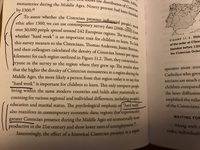
Henrich explains that the Cistercian monks worked tirelessly to improve agricultural and industrial techniques because greater production meant that they would have more resources to fulfill their spiritual vocation. From the 13th century onwards, Henrich notes, English counties with Cistercian monasteries had better growth in productivity than other English counties which lacked Cistercian monasteries.
Additional proof of the Cistercian hypothesis may be found by studying the creation of the hydraulic hammer, which was forged in the Burgundy Abbey of Fontenay in the 13th century. This was a boon to European metallurgy.
Here are some sources for further reading concerning the above:
"The WEIRDest people in the world" by J. Henrich
"La Religion industrielle" by Pierre Musso
"Religious Orders and Growth through Cultural Change in Pre-Industrial England", Andersen & al, 2011
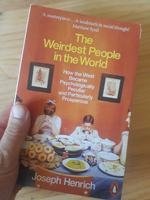
EDIT
I really do believe that Henrich is onto something here. Please take a look at the following maps.
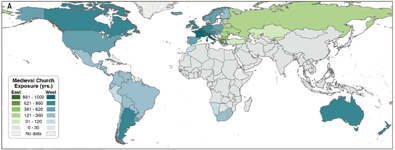
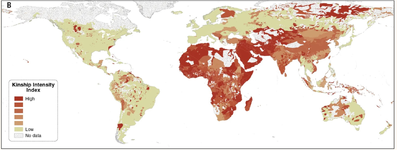
Here's an archive of the Harvard Gazette's review of Henrich's work: https://archive.ph/3aeDt
From the Harvard Gazette:
Comparing exposure to the Western Church with their “kinship intensity index,” which includes data on cousin marriage rates, polygyny (where a man takes multiple wives), co-residence of extended families, and other historical anthropological measures, the team identified a direct connection between the religious ban and the growth of independent, monogamous marriages among nonrelatives. According to the study, each additional 500 years under the Western Church is associated with a 91 percent further reduction in marriage rates between cousins."
“Meanwhile in Iran, in Persia, Zoroastrianism was not only promoting cousin marriage but promoting marriage between siblings,” Henrich said. Although Islam outlawed polygyny extending beyond four wives, and the Eastern Orthodox Church adopted policies against incest, no institution came close to the strict, widespread policies of the Western Church.
Those policies first altered family structures and then the psychologies of members. Henrich and his colleagues think that individuals adapt cognition, emotions, perceptions, thinking styles, and motivations to fit their social networks. Kin-based institutions reward conformity, tradition, nepotism, and obedience to authority, traits that help protect assets — such as farms — from outsiders. But once familial barriers crumble, the team predicted that individualistic traits like independence, creativity, cooperation, and fairness with strangers would increase.
Using 24 psychological variables collected in surveys, experiments, and observations, they measured the global prevalence of traits that correspond or conflict with individualism. To test for willingness to help strangers, for example, they collected data on blood-donation rates across Italy, finding a correlation between high donation rates and low cousin-marriage rates. With their kinship intensity index, Schutz said, they can also predict which diplomats in New York City will or will not pay parking tickets: Those from countries with higher rates of cousin marriages are more likely to get a ticket and less likely to pay one.
And, although willingness to trust strangers, as opposed to family or neighbors, is associated with higher levels of innovation, greater national wealth, and faster economic growth, which factor causes which is not yet known.
“We’re not saying that less-intensive kin-based institutions are better,” said Beauchamp. “Far from it. There are trade-offs.” Tight families, for example, come with inborn financial safety nets.
Henrich also pointed out, in the pages of one of his books, that England's Cistercian monasteries helped improve the work ethic of the populations in which they were situated. The more Cistercian monasteries a county had, the more likely it is for that area's contemporary inhabitants to insist that children be taught the virtues of hard work. Here is the relevant page below:

Henrich explains that the Cistercian monks worked tirelessly to improve agricultural and industrial techniques because greater production meant that they would have more resources to fulfill their spiritual vocation. From the 13th century onwards, Henrich notes, English counties with Cistercian monasteries had better growth in productivity than other English counties which lacked Cistercian monasteries.
Additional proof of the Cistercian hypothesis may be found by studying the creation of the hydraulic hammer, which was forged in the Burgundy Abbey of Fontenay in the 13th century. This was a boon to European metallurgy.
Here are some sources for further reading concerning the above:
"The WEIRDest people in the world" by J. Henrich
"La Religion industrielle" by Pierre Musso
"Religious Orders and Growth through Cultural Change in Pre-Industrial England", Andersen & al, 2011

EDIT
I really do believe that Henrich is onto something here. Please take a look at the following maps.


Here's an archive of the Harvard Gazette's review of Henrich's work: https://archive.ph/3aeDt
From the Harvard Gazette:
Comparing exposure to the Western Church with their “kinship intensity index,” which includes data on cousin marriage rates, polygyny (where a man takes multiple wives), co-residence of extended families, and other historical anthropological measures, the team identified a direct connection between the religious ban and the growth of independent, monogamous marriages among nonrelatives. According to the study, each additional 500 years under the Western Church is associated with a 91 percent further reduction in marriage rates between cousins."
“Meanwhile in Iran, in Persia, Zoroastrianism was not only promoting cousin marriage but promoting marriage between siblings,” Henrich said. Although Islam outlawed polygyny extending beyond four wives, and the Eastern Orthodox Church adopted policies against incest, no institution came close to the strict, widespread policies of the Western Church.
Those policies first altered family structures and then the psychologies of members. Henrich and his colleagues think that individuals adapt cognition, emotions, perceptions, thinking styles, and motivations to fit their social networks. Kin-based institutions reward conformity, tradition, nepotism, and obedience to authority, traits that help protect assets — such as farms — from outsiders. But once familial barriers crumble, the team predicted that individualistic traits like independence, creativity, cooperation, and fairness with strangers would increase.
Using 24 psychological variables collected in surveys, experiments, and observations, they measured the global prevalence of traits that correspond or conflict with individualism. To test for willingness to help strangers, for example, they collected data on blood-donation rates across Italy, finding a correlation between high donation rates and low cousin-marriage rates. With their kinship intensity index, Schutz said, they can also predict which diplomats in New York City will or will not pay parking tickets: Those from countries with higher rates of cousin marriages are more likely to get a ticket and less likely to pay one.
And, although willingness to trust strangers, as opposed to family or neighbors, is associated with higher levels of innovation, greater national wealth, and faster economic growth, which factor causes which is not yet known.
“We’re not saying that less-intensive kin-based institutions are better,” said Beauchamp. “Far from it. There are trade-offs.” Tight families, for example, come with inborn financial safety nets.
Last edited:
This one is one of the most depressing to me. The Church is in the business of caring for your soul, so for it to create hospitals to care for your body was only a natural extension.- Hospitals
Now that Christ has been taken out of the hospitals, what are we left with? A greedy, scam filled industry that is more about making a buck than it is about caring for the sick. How bad has it gotten? To the point where they will unleash experimental viruses on the public, just to sell them the medicine, only to again sell them the medicine for the medicine, all under compulsion and with government backing.
Last edited:
I think its almost impossible to measure the impact of Christianity on our culture because we cannot extract ourselves from the wide net of its influence. It even transcends political boundaries, with a lot of leftist ideas essentially being corruptions of Christian principles. The idea of looking after the poor for instance is a Christian virtue, which leftists insist has to be fulfilled by the state, but the very fact that they even care about it is a fundamentally Christian notion.
Last edited:
forabettertomorrow
Orthodox
My friends this is neonazi globalist West
This one is one of the most depressing to me. The Church is in the business of caring for your soul, so for it to create hospitals to care for your body was only a natural extension.
Now that Christ has been taken out of the hospitals, what are we left with? A greedy, scam filled industry that is more about making a buck than it is about caring for the sick. How bad has it gotten? To the point where they will unleash experimental viruses on the public, just to sell them the medicine, only to again sell them the medicine for the medicine, all under compulsion and with government backing.
I just started listening to a podcast on this from David Patrick Henry. He traces the origin of hospitals back to Saint Basil. He describes the same thing you do and has come to the conclusion that hospitals today are a complete inversion of what they were in the beginning. He goes further suggesting they are now a form of worship - essentially mammon worship.
I'm only 20 min in but it's fascinating so far. It lines up with what I've researched as well. At the onset hospitals were absolutely free, they were run by monastics, and they focused on true wholistic healing - mind, body, and soul. They would always have communion there. Imagine working through your various issues that caused your sickness rather than just getting a pill to treat a symptom. Getting Christian spiritual guidance. It was wholistic in every sense. There is nothing like that anywhere today.
Starts at 8 min in:
Last edited:
I just started listening to a podcast on this from David Patrick Henry. He traces the origin of hospitals back to Saint Basil. He describes the same thing you do and has come to the conclusion that hospitals today are a complete inversion of what they were in the beginning. He goes further suggesting they are now a form of worship - essentially mammon worship.
I'm only 20 min in but it's fascinating so far. It lines up with what I've researched as well. At the onset hospitals were absolutely free, they were run by monastics, and they focused on true wholistic healing - mind, body, and soul. They would always have communion there. Imagine working through your various issues that caused your sickness rather than just getting a pill to treat a symptom. Getting Christian spiritual guidance. It was wholistic in every sense. There is nothing like that anywhere today.
Starts at 8 min in:
I deliberately avoid doctors and hospitals at this point after what we witnessed with the COVAIDS scam. I would feel safer going to the hospital in a Muslim or East Asian country at this point, than to one in the West. You never know what they're going to jab you with if you're incapacitated, if not outright block treatment if you're unvaxxed.

